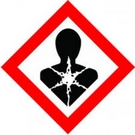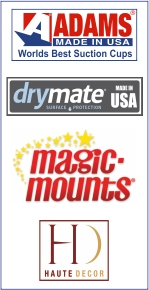Phthalate Free Suction Cups
Due to ongoing worldwide health concerns regarding Phthalates in plastics, Adams USA are on a 12-18 months rolling change to make their entire range of suction cups in Phthalate-free PVC.
Adams will be the world's first and only suction cups manufacturer to do so as standard across their whole range.
The world's best get even better!

After intense research, Adams have developed their own exclusive blend of Phthalate-free material which will be used in all their PVC products.
What are Phthalates? pronounced "thah-lates"
Phthalates are chemical toxic additives that soften or increase the fluidity of a material (a plasticiser). The dominant applications are for plastics, especially Polyvinyl Chloride (PVC) which uses Di(2-ethylhexyl) phthalate (DEHP).
Phthalates are a group of endocrine disrupting toxic chemicals which are already banned in plastic toys and most childcare items.

When the EU decided to classify DEHP as a health hazard and label it as"toxic" with a "skulls and crossbones" symbol, global discussions on reducing exposure to DEHP gained further momentum.
 DEHP. Globally harmonised system of classification.
DEHP. Globally harmonised system of classification.Hazard class and category -Toxic to reproduction category 1
Hazard statement - May damage fertility. May damage the unborn child.
Signal word - Danger
www.gov.uk. Public Health England
"Phthalates are believed to be harmful to human health, causing damage to the reproductive system and increasing the risks of allergies, asthma and cancer. The European Parliament has voted to ban the use of three Phthalates and restrict the use of another three chemicals in plastic toys and childcare articles".
IEMA Institute of Environmental Management and Assessment
In the past few years, researchers have linked Phthalates to asthma, attention-deficit hyperactivity disorder, breast cancer, obesity and type II diabetes, low IQ, neuro developmental issues, behavioural issues, autism spectrum disorders, altered reproductive development and male fertility issues.
Enough distinct phthalates have been studied to indicate that companies should proceed with caution when using any chemical in the phthalate class.




